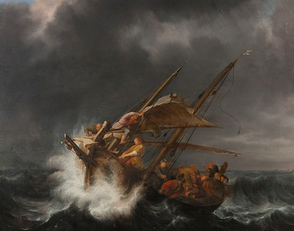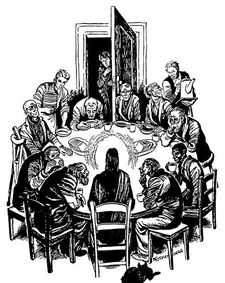 In the first scene we will look at this Sunday, we find Jesus and the disciples in a boat at sea during a terrible storm (Luke 8:22-25). The disciples, among them some who were skilled fishermen, knew it was very bad, life-threatening, and awoke Jesus, who was sleeping on deck, to come help bail. All hands on deck! Jesus wakes, then precedes to rebuke the storm, and all became calm. That is when Jesus asks the disciples, “Where is your faith?” (v. 25). Despite the peril of the storm, it was their imagination, however, that needed bailing, not the boat. They feared the storm; not Jesus. That was the problem. And, that was all about to change. When Jesus asks the disciples, “Where is you faith?,” we tend to hear “You don’t have enough faith” as if Jesus’ question is about quantity. Quantity of faith. We assume Jesus is questioning the amount of faith that the disciples have—and by extension and application, questioning the amount of our faith. Of course, this “application” more typically is used as a proof text of someone else’s lack of faith (not mine!), “You don’t have enough faith” or “That Christian just doesn’t have enough faith.” The issue of “faith” here, however, is not about amount or size or depth or quantity. Of mine. Or even of yours. Nor is this question about “faith” meant for introspection. Naval gazing. In other words, the question is not about the private, individualized amount of faith that the disciples had . . . nor of yours and mine. The question was all about Him. About Jesus. Who is He? This scene is the point in the story when the disciples were confronted (as you and I should be even now in reading the story) with who this wandering-teacher-Rabbi actually is: from the disciples’ point of view, Jesus entered the boat as a teacher, master, someone in the boat who can be called upon to grab a bucket and start bailing; then after the rebuke and the winds calm, the disciples fear he is more than a mere teacher. This is the scene that is before us. Through how he has crafted his narrative, Luke has given a whole other referent concerning “faith.” The disciple's faith. My faith. And, your faith. There are three hints that allow us to infer that Jesus is more concerned about who we believe Jesus is. First, we have the wider context. Earlier we encountered two scenes where Jesus praised someone’s faith: the Centurion when Jesus turns to the crowd, marveling and said, “I tell you, not even in Israel have I found such faith” (7:9) and, then, to the prostitute that had crashed the Pharisee’s supper party, wet Jesus’ feet, drying them with her hair—and in front of all the guests— He announces, “Your faith has saved you” (7:50). Thus, we can (and should) read the question “Where is your faith?” as “you all haven’t figured out yet who I actually am, unlike the Gentile Centurion and unlike the prostitute, who both figured out who I am.” Second, after Jesus calmed (more so, rebuked) the storm, Luke tells us that the disciples “were afraid” (8:25b). They feared. Not a scared kind of fear. But, the fear one has at the sight of a catastrophe happening right in front of you. The fear one has on a boat in the middle of open water during a life threatening storm. Now their fear has the right object: Jesus. (In the next miracle scene, we also encounter “fear,” namely those who had observed the formerly demon-possessed man clothed and in his right mind sitting at Jesus’ feet (vv. 35-37)). Third, the narrative sets us up to ask the question “Who is this?” as the disciples had done. After Jesus calms the storm, the disciples, rightfully, now in good fear, asks, “Who then is this, that he commands even winds and water, and they obey him?”(8:25c). The reader—you and me—already knows from the birth narratives this is no ordinary man. Now we are learning (hearing) what kind of non-ordinary man Jesus is. In the next scene, the question the disciples ask is answered by a demonic-possessed, homeless, naked, man sleeping among the tombs: “Jesus, Son of the Most High God” (8:28c). Amid miracles scenes where Jesus is demonstrating his authority over creation and creation-destroying demonic forces, we are to learn that Jesus is the appropriate object of faith—and fear. We are to be like the Gentile Centurion and the prostitute and not like the disciples. Yes. That’s right. Not like the disciples in that boat. We are to learn from the disciples’ misplaced fear of forces they (we) cannot control (aka, the storm and the demonic-forces). Jesus is the right and appropriate object of fear. The issue here with the question “Where is your faith” is not about some faith we must muster up (that’s makes faith us-centered, you-centered, me-centered); but a faith, that is truly believing and a loyalty (the meaning of the word “faith”) that surrenders to the One who has all authority: Jesus, the Son of the Most High. This is important, first, to the disciples in the narrative, for soon they will be given the commission to imitate Jesus’ authority and mission (9:1). And, we, who are in front of this text, are also to learn that Jesus is the right—and only—object of our faith, the right object of our fear: Jesus, the Son of the Most High who has the power and authority over creation and over creation-destructive powers (the next miracle scene). For, we, too, are to be his disciples, bearing witness to this Jesus.
0 Comments
 Sermon prep for and thoughts from my study of the last half of Luke's Sermon on the Plain (Luke 6) . . . Church, imagine a trafficked woman and one who used to enslave women sitting at that Table, after breaking bread, having a supper, and after lifting that fourth cup together to celebrate Jesus as Savior and King . . . imagine a beggar and a wealthy man . . . imagine a wife and her husband, who'd normally have been found with a temple prostitute or at a similar supper using women as entertainment . . . imagine young boys and men who had, until recently, frequented similar suppers where such young boys were entertainment . . . imagine . . . imagine the early church gathered at that Table now ready to listen to someone read the parchments containing Luke's Gospel . . . imagine . . . Imagine hearing the Sermon on the Plain being read (Luke 6:20-49) . . . imagine they all hear, not only the blessings on the poor and the cursing on the rich (vv. 20-26), but hear “love your enemies,” “do good to those who hate you,” “pray for those who abuse you” (vv. 27--29). . . “do not judge” . . . “do not condemn” . . . “forgive to be forgiven” (v. 37) . . . and “give and lend without regard to getting anything in return” nor “demand back what was taken” (vv. 35, 38) . . . imagine those who were around those first Tables, not only hearing these words, but doing them . . . Sometimes I think we have it way too easy at this church stuff and that has dulled our hearing . . . and flattened our doing . . . and it is no wonder our houses crash when those winds come . . . it is not enough to be hearing His word and, frankly, it is not enough just to do the word where it is easy and socially and culturally safe. Other Luke 6 Sermon on the Plain thoughts . . .
|
AuthorChip M. Anderson, advocate for biblical social action; pastor of an urban church plant in the Hill neighborhood of New Haven, CT; husband, father, author, former Greek & NT professor; and, 19 years involved with social action. Archives
February 2024
Categories
All
|
Pages |
More Pages |
|
 RSS Feed
RSS Feed